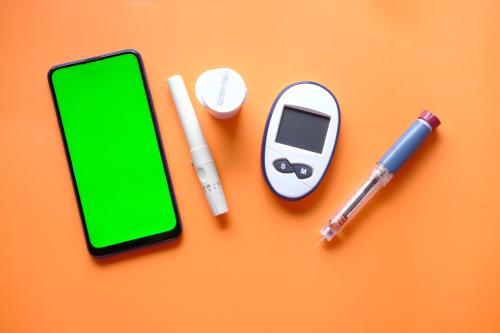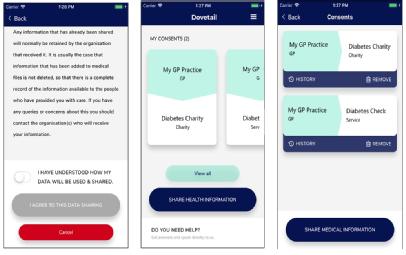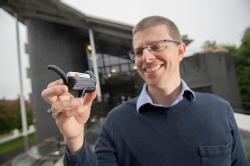WMG News
Using digital flash glucose monitoring for people with diabetes & COVID-19 frees up NHS resources
- Patients with diabetes hospitalised with COVID-19 at University Hospitals Coventry and Warwickshire (UHCW) NHS Trust used flash glucose monitors as inpatients rather than traditional methods
- This approach was evaluated by researchers from WMG at the University of Warwick and University Hospitals Coventry and Warwick NHS Trust
- Patients who used the non-invasive skin monitors were adequately cared for and freed up resources making the care and monitoring of the high-risk
 patients more efficient
patients more efficient
People with diabetes are at a higher risk of poor outcomes and severe illness if they develop COVID-19, they need careful glucose monitoring to ensure appropriate glycaemic control during a period of any acute illness, including due to COVID-19.
In order to support the management of these patients at UHCW, digital flash glucose monitoring devices were used as part of a a nationally leading research project. Researchers from WMG at the University of Warwick, and UHCW evaluated the benefits of this trailblazing research.
They found that patients were able to be monitored as effectively as using traditional methods, such as finger pricks and time was saved enabling staff to car for more patients.
Professor Theo Arvanitis from WMG, University of Warwick comments:
“Traditional ways of measuring glucose levels are time consuming and put pressure on resources especially when under pressure from the pandemic, therefore the use of flash glucose monitoring can help free up resources.
“We are pleased to have carried out the first pilot inpatient use of digital flash glucose monitors in an NHS hospital. Overall, there are strong arguments for the inpatient use of these devices in the COVID-19 setting, as we have found that this approach if effective in monitoring patients and can help NHS workers when resources are tight.”
Professor Harpal Randeva from UHCW NHS Trust comments:
“The use of these devices frees nursing time, allows closer monitoring of patients and is popular with them. Building on this evaluation we have now offered devices to over 400 patients with diabetes and COVID-19 and feel this project represents a key step-change in providing care for people with diabetes in hospital. This approach builds on UHCW NHS Trusts Vision of being a National and International leader in healthcare, with a clear focus on world leading digital technology”
Professor Sailesh Sankar from UHCW NHS Trust added:
“Innovation is at the heart of providing the best quality care for people with diabetes. Whilst these devices have been used in the outpatient context, we have achieved the widespread use of devices in an inpatient benefiting both patients and staff. We hope others nationally can learn from this project” The monitor works by measuring glucose from interstitial space, rather than from the blood. They are applied to the patient’s skin and measure glucose levels every 15 minutes for up to 14 days. The glucose levels are then easily read by placing an electronic reader or smartphone over the device, which is more convenient and less invasive than finger-prick monitoring.
Data was gathered from patients who were monitored during their stays, the data was then analysed, and potential associations were explored between relevant parameters, including time in hypoglycaemia, hyperglycaemia, and in range, glycated haemoglobin (HbA1c), average glucose, body mass index (BMI), and length of stay.
Percentage of time in hyperglycaemia exhibited significant associations with both percentage of time in hypoglycaemia and percentage of time in range.
View the academic article hereLink opens in a new window
Autistic children in Berkshire school to benefit from new Digital Healthcare Apprentice support
Prior's Court, a specialist residential school in Berkshire and training and development centre for young people aged between 5-25 who are severely affected by autism, is working with WMG at the University of Warwick to help recruit two specialist Digital Healthcare apprentice staff.
The new Digital Healthcare Apprentices will investigate and evaluate data collected on Prior’s Court pupils to support improvements in the wellbeing and experiences of young people with autism at Prior's Court –and will be part of the first wave of a new, innovative national digital healthcare science workforce, working in health and social care to improve people’s health and wellbeing.
Using ‘Big Data’ mining techniques the apprentices, working under joint supervision by academics and specialist autism practitioners, will be able to sift more than a million data points to identify circumstances which predict particular behaviour patterns. This will in turn enable earlier intervention steps to be taken.
This could make a major difference to their quality of life, minimising incidents and perhaps even enabling a young person at the school to later enter employment where this was may have not been previously possible.
The two new Digital Healthcare Apprentices will provide specialist support to the Foundation and its young people, while also studying towards a Bachelor of Science Undergraduate degree in Digital Healthcare Science with the University of Warwick drawing on the expertise of two departments – WMG and Warwick Medical School.
Prior’s Court Chief Executive Mike Robinson said: “Autism is a complex condition. The fundamental question ‘Why does someone with autism have a good day or a bad day?’ is a difficult one to answer. For the young people at Prior’s Court who are severely affected by autism, often with other complex coexisting conditions, it is almost impossible to answer. We believe that by applying the power of being able to collect and analyse large quantities of data to this problem, we will be able to start to answer the question.
“Our digital platform Prior Insight is capturing thousands of pieces of data on our young people every day but it is the practical application which is key. By working with the University of Warwick and recruiting Digital Healthcare Apprentices we can ensure that data is comprehensively analysed and applied to positively impact the lives of many more people with autism – both at Prior’s Court and in the wider world of autism.”
Professor Ed Peile, of Warwick Medical School, comments:
“On my first visit to Prior’s Court I was inspired by how the team there are constantly striving to help young people with severe autism lead happy and fulfilling lives. I was keen to see their cutting edge project using the digital platform ‘Prior Insight’ and to understand what role future members of the new specialism Digital Healthcare Science could play.
“It was immediately apparent to me that, both in their apprenticeship training and when they graduate, Digital Healthcare Scientists have so much to offer at Prior’s Court, and so much to gain there. Thanks to the investment in data collection at Prior’s Court, there is a huge amount of information about how each young person functions.
“Not only that, but working with other technologies including ‘wearable digital technology’ and using the skills of behavioural science and shared decision-making taught on our innovative ‘fusion science course’ will enable the apprentices to contribute as they learn in the workplace.”
How to apply
Applications for the two new roles close in just two weeks on 30th September 2020. Details on how to apply can be found here
Patients prefer their consent to share their data and to manage it digitally
Patients with diabetes often have to see many different stakeholders who each specialise in different aspects of their treatment. Researchers from WMG, University of Warwick surveyed patients on their understanding of how their data was shared, and found they would prefer to have it shared digitally using the Dovetail Digital consent application.
 There are 4.7 million people in the UK live with diabetes, and will spend a lot of time visiting different specialist in different practices, who each specialise in some aspect of their treatment. Furthermore advances in digital technologies have resulted in innovative applications, which supported by healthcare professionals enable self-management, empowering patients to take control over aspects of their care. This requires a lot of data sharing, which is currently done by one practice requesting the medical records off another practice; with the need for doctors consent to share, this can be a long process to sign off. Furthermore, the process tends to be obscure with the patients forgetting the transfers for which they have given consent, as well not being very easy to revoke consent should the want so. The ability of patients to have control is one of the fundamental ethical and legal rights of the patient, and in many cases is difficult to balance against beneficial but data sharing intensive applications.
There are 4.7 million people in the UK live with diabetes, and will spend a lot of time visiting different specialist in different practices, who each specialise in some aspect of their treatment. Furthermore advances in digital technologies have resulted in innovative applications, which supported by healthcare professionals enable self-management, empowering patients to take control over aspects of their care. This requires a lot of data sharing, which is currently done by one practice requesting the medical records off another practice; with the need for doctors consent to share, this can be a long process to sign off. Furthermore, the process tends to be obscure with the patients forgetting the transfers for which they have given consent, as well not being very easy to revoke consent should the want so. The ability of patients to have control is one of the fundamental ethical and legal rights of the patient, and in many cases is difficult to balance against beneficial but data sharing intensive applications.
However, researchers from the Institute of Digital Healthcare (IDH) at WMG, University of Warwick propose that a new system called the Dovetail Digital consent application is favourable, and have analysed it in the paper; ‘Evaluation of patient perception towards dynamic health data sharing using blockchain based digital consent with the Dovetail digital consent application: A cross sectional exploratory study’, published in the journal Digital Health, SAGE Publications.
The Dovetail digital consent application is a robust, trusted and flexible mechanism for patients to offer their consent for their data to be shared between GP practices; they can also revoke consent at any point, therefore empowering them to manage their condition within an integrated care setting.
Dovetail sees a mobile application and blockchain-based infrastructure, meaning they can trace where their data has been shared. Blockchain is a state-of-the art technology originating in the financial industry, which has allowed implementing healthcare applications with the confidence and robustness found in the financial sector.
To survey whether it would work, IDH researchers asked 23 patients and 13 staff with diabetes, at a GP practice, to complete a series of questionnaires, followed by a focus group discussion, to determine their understanding of current methods to share data in a medical setting, and to see if they recall giving consent.
IDH Researchers then conducted a thematic analysis of the focus group transcripts and descriptive statistics of the questionnaires were performed.
Professor Theo Arvanitis, Director of the Institute of Digital Healthcare at WMG, University of Warwick explains what they found:
“We discovered there was a lack of understanding of existing consent processes in place, in fact many patients did not have any recollection of having previously given consent to their data being shared. When we asked them what they thought about the digital consent application patients overwhelmingly favoured the digital consent application over existing practice, as they recognised the value of the capability offered by the application.”
Dr George Despotou, Associate Professor at the Institute of Digital Healthcare and lead in the study comments:
“The study participants welcomed an application that would ultimately contribute to improving their quality of case, whilst maintaining control over their data. In particular the study participants acknowledged the clarity of the consent application, and the ease with which they could review, as well as revoke existing consents. This was a very promising study on a technology that may be opening the way for highly innovative applications improving quality and efficiency of healthcare services, which patients would welcome, assured that ultimately they are in charge of their data.”
IDH Researchers were able to conclude that the digital consent was received favourably as patients were able to recognise that it addresses the main limitations of the current process, but also acknowledged the traceability and transparency of the Dovetail app. Further research can now be conducted to see if patients across a wider demographic prefer the Dovetail Digital consent application, and if successful could revolutionise the way that patient data is stored and shared.
Paper available to view at: https://journals.sagepub.com/doi/10.1177/2055207620924949
New MRI computing technique can spot scar muscles of heart without damaging kidneys
 - Traditional MRI scans use the metal gadolinium, which resonates areas of the heart muscles that are not functioning efficiently, however gadolinium affect the Kidney function
- Traditional MRI scans use the metal gadolinium, which resonates areas of the heart muscles that are not functioning efficiently, however gadolinium affect the Kidney function
- The new 3D MRI computing technique calculates strain in heart muscles showing which muscles are not functioning enough without damaging other organs - researchers at WMG, University of Warwick have found
- The new technique is less stressful for the patient
3D MRI computing can measure strain in the heart using image registration method. Traditional method involves giving the patient a dose of gadolinium which can affect the kidney, researchers at WMG, University of Warwick have found.
MRIs are used to diagnose cardiac disease such as cardiomyopathy, heart attacks, irregular heartbeats and other heart disease.
Traditionally when a patient goes for an MRI scan they are given a dose of gadolinium, which reacts the magnetic field of the scanner to produce an image of the protons in the metal realigning with the magnetic field. The faster the protons realign, the brighter the image features and can show where the dead muscles are in the heart and what the diagnosis is.
The dose of gadolinium can have detrimental effects to other parts of the body, particularly the risk of kidney failure.
A new 3D MRI computing technique developed by scientists in WMG at the University of Warwick, published today, 28th August, in the Journal Scientific Reports titled ‘Hierarchical Template Matching for 3D Myocardial Tracking and Cardiac Strain Estimation’ focuses on Hierarchical Template Matching (HTM) technique. Which involves:
- A numerically stable technique of LV myocardial tracking
- A 3D extension of local weighted mean function to transform MRI pixels
- A 3D extension of Hierarchical Template Matching model for myocardial tracking problems
Therefore meaning there is no need for gadolinium reducing the risk of damage to other organs.
Professor Mark Williams, from WMG at the University of Warwick comments:
“Using 3D MRI computing technique we can see in more depth what is happening to the heart, more precisely to each heart muscles, and diagnose any issues such as remodelling of heart that causes heart failure. The new method avoids the risk of damaging the kidney opposite to what traditional methods do by using gadolinium.”
Jayendra Bhalodiya, who conducted the research from WMG, University of Warwick adds:
“This new MRI technique also takes away stress from the patient, as during an MRI the patient must be very still in a very enclosed environment meaning some people suffer from claustrophobia and have to stop the scan, often when they do this they have to administer another dose of the damaging gadolinium and start again. This technique doesn’t require a dosage of anything, as it tracks the heart naturally.”
Unfit people are more physically active because of the Sweatcoin app that pays you to walk
More people are physically active due to the Sweatcoin app which rewards you for walking – researchers at the Institute of Digital Healthcare, WMG at the University of Warwick have found. Sweatcoin gets people outdoors and walking to earn a virtual currency to spend in their marketplace.
Reaching your target number of steps a day is a little easier for those using the app called Sweatcoin which rewards users with a virtual currency for walking.
Sweatcoin works by converting the number of steps recorded on your phone into a virtual currency of Sweatcoins.
Every 1,000 steps generate 0.95 Sweatcoins and these can be used to purchase products on the in-app marketplace, (with prices ranging from 5 to 20,000 Sweatcoins), in local shops, or be transferred between other users.
Currently, steps recorded outdoors are rewarded due to the use of a GPS-based verification algorithm used to stop people cheating their phone’s step-counting algorithm.
The Institute of Digital Healthcare, WMG at the University of Warwick analysed daily step count data from 6000 users of the app, and found that there was a sustained average increase of nearly 20% in daily step count over a 6-month period after users had registered with the app, in comparison with a 3-month period prior to downloading the app.
Following a survey on a sample of the original 6000 users, those who were classified as less physically active and overweight were found to be most likely to increase their daily step count when using the app, meaning that Sweatcoin was having impact on an important section of the population who previously had low levels of physical activity.
 Dr Mark Elliott, Assistant Professor at the Institute of Digital Healthcare, WMG - University of Warwick comments:
Dr Mark Elliott, Assistant Professor at the Institute of Digital Healthcare, WMG - University of Warwick comments:
“We were delighted to have the opportunity to work with Sweatcoin and investigate how their app impacts on physical activity behaviour change. By analysing the daily step count data from a sample of Sweatcoin users and combining this with data from the surveys and focus groups facilitated by our researchers, we were able to identify which types of user had shown the biggest change in terms of increased physical activity from using the app.”
Anton Derlyatka co-founder at Sweatcoin comments:
"Incentivising people to walk more is key to improving levels of sustained physical activity. Yet, traditional ideas such as providing educational seminars or discounted gym passes, just don’t deliver. The University of Warwick found that an economy built on movement, as created by Sweatcoin, establishes sustained motivation for people to be more active. For an increasingly sedentary population facing an obesity and wellness crisis, these are significant findings.”
Lord Philip Hunt, Sweatcoin Advisory board member commented:
“Most health apps and initiatives tend to be aimed at those who are already active. Sweatcoin has huge potential in encouraging and incentivising non-active people to get walking. Given the health gains that can be achieved through increased physical activity, this is the kind of breakthrough we need to help motivate who can benefit most.”
New pelvis motion tracking technology to transform hip replacement decisions
A new pelvis motion tracking device developed by WMG, at the University of Warwick, can help detect flexible pelvises without numerous x-rays, to determine who will benefit from more advanced surgical planning before hip replacement surgery.
 Researchers at WMG’s Institute of Digital Healthcare and Professor Richard King, of University Hospital Coventry and Warwickshire - and Honorary Professor at Warwick Medical School, have developed a small device that can be put at the bottom of your back to scan the movement of your pelvis prior to a hip replacement.
Researchers at WMG’s Institute of Digital Healthcare and Professor Richard King, of University Hospital Coventry and Warwickshire - and Honorary Professor at Warwick Medical School, have developed a small device that can be put at the bottom of your back to scan the movement of your pelvis prior to a hip replacement.
WMG research helps expand Sweatcoin capabilities
Researchers at our Institute of Digital Healthcare (IDH) have been working, with the health and fitness app Sweatcoin, to develop a new verification process that will now allow indoor steps to be tracked for the first time.
Sweatcoin monitors steps throughout the day, via an app downloaded to a smartphone. Users are rewarded with one Sweatcoin (SWC) per every 1,000 steps. The digital currency can then be redeemed for items including magazines, clothing, music downloads and even televisions.
Previously the app was only capable of tracking outdoor steps - a big disadvantage for those with active jobs indoors or even those using the gym.
The 12-month project, funded by Innovate UK, collected large amounts of data from the sensors built into smartphones in parallel with step-count data recorded using high accuracy activity monitors. Researchers on the project then used this data to create a new step-verification model to work in any environment, not just outdoors.
Pregnancy loss biobank to receive £1.2million in funding
Research to help identify women at risk of pregnancy complications is to receive a huge financial boost.
The Medical Research Council (MRC) is to give The Tommy's Reproductive Health Biobank a grant of £1.2million.
The biobank will be the most significant collection of reproductive health tissues in the UK. Operating on a virtual basis with its server based at University Hospitals Coventry and Warwickshire NHS Trust (UHCW) and will begin operating on 29 September. It will store biological samples collected by scientists and clinicians at UHCW, the University of Warwick, University of Birmingham, Imperial College, Kings College London, University of Edinburgh and University of Manchester. The tissues, donated by women who have a history of pregnancy problems, and clinical data will help scientists find new causes and cures for miscarriage, stillbirth, and premature birth.
People are reluctant to use public defibrillators to treat cardiac arrests
A study led the University of Warwick suggests that people are reluctant to use public access defibrillators to treat cardiac arrests.
The analysis of existing international studies, which has been published in the European Heart Journal – Quality of Care and Clinical Outcomes, suggests that there are a number of factors that prevent members of the public from using them and potentially saving lives.
The researchers’ study suggests that many members of the public don’t know what an automated external defibrillator (AED) is, where to find one and how to use one. This is despite AEDs being suitable for use by untrained members of the public. Although studies suggest there is variation across the studies they analysed in the number of people willing to use an AED a lack of confidence and fear of harm are common themes.
The research, Barriers and facilitators to public access defibrillation in out-of-hospital cardiac arrest: a systematic review, was conducted by Warwick Medical School, the University of Warwick; the Institute of Digital Healthcare, WMG, the University of Warwick; Heart of England NHS Trust, Birmingham; London Ambulance Service NHS Trust and Imperial College Neurotrauma Centre, St Mary’s Hospital, London.
Researchers help digital currency users get more rewards for exercising
Researchers at the Institute of Digital Healthcare in WMG, University of Warwick have been awarded an Innovate UK grant to assist Sweatco Ltd to further develop their app for users to earn more rewards from a broader range of exercise activities.
Sweatcoin, a digital currency generated by physical movement captured on a smartphone, has been a huge success, having already converted more than 80 billion of its users’ physical steps into virtual coins in reward for their exercise (walking and running). For now, Sweatcoin’s proprietary algorithm verifies outdoor movement using a number of other sensors, including GPS, to prevent potential ‘gaming of the system’.
The company now wants to expand the app to allow users to earn digital currency while cycling and when inside buildings, including activities such as running on a treadmill or simply walking around whilst at work. With the help of an Innovate UK grant, they are working with researchers in the Institute of Digital Healthcare in WMG at the University of Warwick to develop a solution, while blocking any methods to cheat through the use of computer validation techniques.

